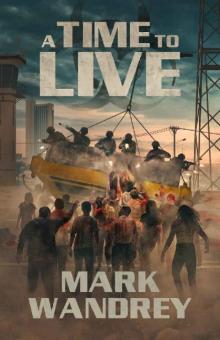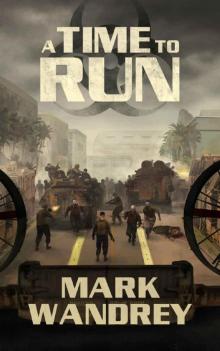- Home
- Wandrey, Mark
Turning Point (Book 3): A Time To Live
Turning Point (Book 3): A Time To Live Read online
A Time To Live
Book Three of the Turning Point
By
Mark Wandrey
PUBLISHED BY: Blood Moon Press
Copyright © 2020 Mark Wandrey
All Rights Reserved
Get the free Four Horsemen prelude story “Gateway to Union”
and discover other titles by Mark Wandrey at:
http://worldmaker.us/
* * * * *
Get the free Four Horsemen prelude story “Shattered Crucible”
and discover other Blood Moon Press titles at:
http://chriskennedypublishing.com/
* * * * *
Cover Design by Konstantin Kiselyov
* * * * *
This book is dedicated to the most welcoming person in fandom I knew,
the creator of LibertyCon, Timothy Bolgeo, or as we affectionately knew him,
Uncle Timmy. Thank you for all you did, and God Speed.
* * * * *
License Notes
This ebook is licensed for your personal enjoyment only and may not be re-sold or given away to other people. If you would like to share this book with another person, please purchase an additional copy for each recipient. If you’re reading this book and did not purchase it, or it was not purchased for your use only, then please purchase your own copy. Thank you for respecting the hard work of this author.
This book is a work of fiction, and any resemblance to persons, living or dead, or places, events or locales is purely coincidental. The characters are productions of the author’s imagination and used fictitiously.
* * * * *
Contents
Prologue
Chapter 1
Chapter 2
Chapter 3
Chapter 4
Chapter 5
Chapter 6
Chapter 7
Chapter 8
Chapter 9
Chapter 10
Chapter 11
Chapter 12
Epilogue
Connect with Mark Wandrey Online
About the Author
Excerpt from Book One of the Earth Song Cycle
Excerpt from Book One of The Fallen World
Excerpt from Book One of The Darkness War
Excerpt from Book One of The Shadow Lands
* * * * *
Prologue
“Wake her up.”
“I don’t think that’s a good idea, considering the severity of her burns.” Dr. Meeker looked at the patient with some concern.
“Do what I said.”
Meeker looked from his patient to Michael and back again. After a moment, he went to the wheeled medical cart, removed a hypodermic, and slid the needle into the IV port to inject the drug. In less than ten seconds, the patient’s eyes were fluttering.
“You might only get a few minutes,” Meeker explained. Michael nodded. “And this could kill her.”
“Then she dies.” The doctor’s jaw dropped. “Get out.” He hesitated. “Now.” He fled.
Michael walked over to the edge of the bed. The woman was uncovered, exposing most of her naked body. He wasn’t interested in her in any way other than clinically. Moist bandages covered the vast burns where her flesh was all but gone. Her face was ruined, and all her hair that hadn’t been burned away had been shaved off. He wished he could have let her drown, but he had questions that needed answering.
“You awake yet?” he asked. When there was no response, he reached for one of the moist bandages and laid a hand firmly on the wound underneath. Her eyes shot open, and she screamed. “Ah, there you are.”
She looked from side to side in the darkened medical bay, from the beeping bio-sign monitor next to the bed to the IV dripping into her arm, then up at him. “W-who are you?” she stammered.
“You may call me Michael,” he said. “And you are LTJG Pearl Grange, acting commander of the USCGC Boutwell. You took command when your captain succumbed to Strain Delta. Afterward, you began assisting in SAR off San Diego.” Grange watched him for a moment, her mind hazy from drugs and pain. He was a big man, physically powerful and clean shaven, with ultra-short, black hair. Despite it being dim to the point of darkness in the room, he was wearing sunglasses.
“Are you the one who sank my ship?” He didn’t comment. “Are any of my crew alive?” The sunglasses didn’t waver. “What do you want, damn you?”
“I want to know if you are who I described.”
“Grange, Pearl, USCG,” she said through clenched teeth, then added her ID number. Inconceivable pain made her jaw muscles quiver.
He grunted. “Good. Now, tell me what you were doing in the Columbia River a week ago.”
“A week?” her voice croaked. “It’s been a week? What about my crew?”
“Answer the question, Lieutenant.”
Grange’s mind was still buzzing, but more of her memory was returning. The fight at the lighthouse. The trip up the river. The attack by the gunships, and the missile exploding. Shock, shattering glass, screaming men and women, then fire and agony. So much agony. Then she had felt the slap of water, and darkness had followed. Until now.
“Where…is…my…crew?” She spoke slowly and deliberately, as if she were talking to a child.
“What were you doing in the Columbia River? Whose orders were you following? Who’s in command of this Flotilla?” She felt herself slipping into darkness, her vision like a tunnel.
“Go to hell,” she said, the last word a whisper. She drifted into darkness again.
Michael sighed, looking from the unconscious form to the life signs monitor. Her pulse was elevated but slowing. She’d survived the brief questioning, but the stimulants the good doctor had administered had worn off. Michael walked to the door and pulled it open. Dr. Meeker spun on him, eyes wide in surprise. “Your patient is still alive,” he said. The doctor nodded. “I’m going to need to question her some more. CVR.”
“I’ll need your authorization for the supplies.”
“You’ll have it.” He walked out and turned down the hall.
“What then?” Dr. Meeker asked. “I said, what then?” he yelled after Michael’s retreating back.
Michael passed through three security doors, all guarded, then rode down in an elevator, getting off at the bottom. Two guards waited there. Both checked his identification, even though nobody on the ship would fail to identify him. Cleared, he walked down the short corridor, turning at the biohazard sign into a room. The space was filled from top to bottom with computers and monitors.
“Good afternoon, Michael,” the only person in the room, a woman, said. She had three large screens arrayed in front of her covered in raw data and symbols. She was quite old, with nearly waist-length, white hair held in a single tie at the back of her head. Despite her advanced age, her eyes were bright blue and spoke of extreme intelligence. Like all the non-combat personnel on the ship, she wore a simple, blue coverall. However, she, Michael, and five others had a simple, seven-sided symbol on the right sleeve of their coveralls.
“How are things proceeding, Jophiel?”
“Slowly,” she said, shaking her head. “Oh, so slowly.”
“Let me see,” he said, and he pointed to the only wall not covered in monitors or computer hardware. Jophiel shrugged and touched a control. The wall became a window. On the other side was a cell the same size as the observation room. Its sole occupant reclined in a small, self-supporting hammock in one corner, apparently asleep. As if it knew the wall had become transparent, its tiny, black eyes popped open. It turned its pointy, snouted head slightly to look at him in a strange, uncanny way.
“How do we know it can’t understand us
?” Michael asked.
“Because aliens only understand English in bad science fiction films. I’m a linguist; it isn’t easy to fool me. He’s had numerous opportunities to respond and gain some benefits or give away some truths. Never once has he taken the chance.”
“Why do eggheads always think aliens aren’t smart enough to fool them?” Michael responded. He regarded the alien through the thick plexiglass. The bio seal was perfect, or at least as perfect as mankind was capable of manufacturing, even with the advanced technology they had. “Why should we trust it?”
“Him.”
“Huh?”
“Him,” Jophiel said and gestured toward the alien who seemed to be watching them through the mirrored window. “He is a male.”
“Well,” Michael said, “we’re running out of time, and we need answers.” The alien hopped gracefully from the hammock and padded over to the window. With his stooped posture, reversed knees, bushy tail, and pointed, reddish snout, he really did look like a terrestrial fox. He was half Michael’s size. He looked up into his face, which he must have been able to see though the glass somehow. “The Heptagon will meet in a few hours and then we’ll have to decide what to do about the Flotilla. If LTJG Grange doesn’t give us answers, we’ll have to find them somewhere else.”
From the other side of the glass, the alien fox stared at him. The two regarded each other, calculating and considering what came next.
* * * * *
Chapter 1
Morning, Thursday, May 2
The Flotilla
150 Nautical Miles West of San Diego, CA
Lieutenant General Leon Rose, former commander of US Army III Corps, stood on the bridge of his ship and looked through binoculars. “I’m on a fucking ship,” he growled.
“Yes, sir,” one of the bridge personnel said.
Rose took the glasses from his eyes and turned toward the man. “How the fuck does an army general end up living on a fucking ship?” The formerly helpful man shrugged in reply. Rose shook his head and returned to his binoculars.
The USS Ronald Reagan, CVN 76, was less than a mile away. Rose might not have known shit about nuclear powered aircraft carriers, but he knew they weren’t supposed to be tilting 20 degrees or so and pouring flames from the side. “How in the hell had things gone so sideways?”
“I don’t have any details yet,” Captain Mays, Rose’s assistant said. The man had been with Rose for three years, the longest he’d ever had an aide. Now that general command and his III Corps were no more, the record would never be broken. “The Marines were about to go aboard when a huge explosion blew out the hangar deck.”
“You sure it wasn’t the fucking Marines who caused the explosion?”
“Pretty sure,” Mays said, trying hard to hide his grin. “Captain Rutledge is now in command of the Essex. He reports having just over two companies available. One was in those inflatable boats—”
“RHIBs,” Rose said, lowering the binoculars. “They call them RHIBs.”
“Sure,” Mays nodded. “They were in RHIBs, about to climb aboard, when it blew. Rutledge said his men were armed only with small arms, not even grenades.”
Rose grunted again and put the binoculars back to his eyes. Whatever was on fire was really burning. Jet fuel, maybe? A titanic explosion sent sections of steel cartwheeling through the morning sky. The RHIBs accelerated farther away from the stricken ship. One of the big elevators leaned, then collapsed. The ship slipped further into the water.
“There goes a few billion dollars,” Rose said as the ship’s nose slipped below the waves.
“What about the reactor?” Mays wondered.
“Least of our concerns,” Rose replied.
“Navy reactors are designed to keep from melting down,” the still helpful bridge crewman said.
“See,” Rose said. “Not our concern.”
“You’re the ranking military officer,” Mays said.
“And the fucking president is dead,” Rose said. He didn’t sound upset. An undertone of good fucking riddance was easily discernable. “Anyone ever figure out what happened?”
“We’re a little short on navy personnel just now,” Mays said.
Rose nodded. The navy had lost most of their pilots in the fiasco that had allowed Coronado to receive the president. Why hadn’t the silly bitch just bailed out, like any sensible person would have? Any other sensible president would have.
Rose hadn’t met the pilot who had crashed into the president’s plane. He only knew the man was at the right place, at the right time. He’d provided vital CAS, close air support, dropping ordnance on exact targets, multiple times, to save lives. Then he’d blown the Coronado bridge—against orders. It had helped, too, because thousands of infected had been flowing across the span, drawn by the battle. Then he went back to helping the Marines, as if he’d never disobeyed orders.
In the end, he’d rammed the president’s plane when it was on final approach. Fucking hell, what had gone through the man’s head? Probably the dashboard, Rose chuckled at his own gallows humor. So now, they had no president. He shrugged. So what? Until she had shown up a day ago, they hadn’t had one.
It had only been a few weeks since the plague struck. The scientists called it Strain Delta. Naming the thing had been the end of their usefulness. Eggheads had struggled for weeks to understand the basics of how the disease worked. The only one who had a clue was Dr. Lisha Breda on her oil platform converted to a mad scientist’s lab. The eggheads at the CDC were probably eating each other, but Dr. Breda was working on the nightmarish thing.
“Any word from the young lieutenant we sent north?” he asked Mays.
“No, General. Last comm we got was two days ago.”
“Another lost soul we’ll never hear from again.” Rose turned his glasses to look at the oil platform where Dr. Breda lived and worked. It sat in the sea, stolid, angular, timeless. He dearly hoped she figured out a way to stop the disease, though he doubted it was possible. He turned back to the Reagan; it was more than halfway below the waves.
“You see the comms from the Marines coming through the Panama Canal?”
“More shit about aliens?” Rose asked, then shook his head. “We’ll see if they get here.” He continued watching until the ship was no more.
* * *
HAARP Research Facility
150 Miles West of San Diego
“One of their carriers just sank.”
Dr. Lisha Breda looked up from her coffee and muffin in confusion. “What?”
“A carrier sank.”
Lisa could see her assistant, Edith Unger, or Beth as she preferred, was excited and a little scared. “You mean an aircraft carrier?” Beth nodded. “Dear, there’s nothing here that can sink a carrier.”
“A Strain Delta outbreak on the ship,” Beth explained. “Then something exploded.”
“Show me,” Lisha said, and Beth led her out to the observation deck.
At first, Lisha thought it was just a fishing boat on its side. Then, slowly, her mind put the shape together into a recognizable form. The fantail of a huge carrier was slipping below the waves, flames pouring from it as the great ship sank.
“Oh, that’s not good.” Hundreds of ships and boats were moving away from the sinking carrier as if it were an infectious person in their midst. Maybe such an analogy wasn’t too far from the truth. “Any idea how there was an outbreak?”
“None,” Beth said. “Their admiral was on the boat.”
“Hopscotch or Hoskins?” She couldn’t remember which was right.
“Yes, ma’am.”
“Shit,” she said and went back inside. They didn’t have much to fear more than 100 miles from shore. The converted oil platform served as a base of operations for a research project deemed illegal by most governments.
HAARP, the Human Advancement and Adaptive Research Project, was a cute acronym for an endeavor which had the potential to change humanity’s destiny. Through complete mapping of the
human genome and comparison against other animals already sequenced on the planet, all possible ‘problems’ with the species’ genetics could be identified and removed. Further, possible improvements could be introduced. Some called it eugenics, others God’s work. For Dr. Lisha Breda, HAARP was her life’s calling. Then, along came Strain Delta.
Back in her lab, she looked at the computer terminal and sighed. Petabytes of data on HAARP were stored there, and she hadn’t done anything with them for weeks. Everything had been backed up in nine locations around the planet. Quietly duplicated, though only a few knew where. Shortly after the catastrophe went worldwide, she’d verified that all the backup locations were offline, possibly destroyed. They were an island in the midst of the storm.
“I need to get this data packed up and mobile,” she told Beth, who nodded. “Get Oz on it when he wakes up.”
“Yes, ma’am.”
The military was coming apart without leadership; that much was obvious. The sinking carrier spoke volumes about the disintegrating situation. More military was coming soon, but would they bring cohesion and control, or chaos and death?
She used her computer to access the rig’s various cameras. Thanks to the camera placement, they provided almost 360-degree coverage. Most of the boats and ships were moving away from her rig. One wasn’t. It appeared to be adrift only a short distance away. Further out was the distinct and unusual shape of a ship modified to launch rockets. It was obviously under control. Her eyes narrowed as she looked at it, and the beginnings of a plan formed in her mind.

 Turning Point (Book 3): A Time To Live
Turning Point (Book 3): A Time To Live Turning Point (Book 1): A Time To Die
Turning Point (Book 1): A Time To Die Turning Point (Book 2): A Time To Run
Turning Point (Book 2): A Time To Run